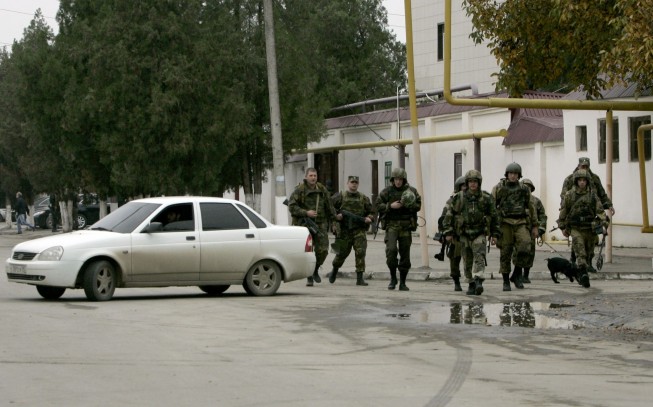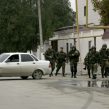
Kabardino-Balkaria Youth Protest Against Moscow Reaches Tipping Point
Publication: Eurasia Daily Monitor Volume: 8 Issue: 132
By:

On July 6, a massive anti-government protest took place in the town of Baksan, Kabardino-Balkaria. An estimated 600 unarmed young men blocked a vital highway connecting the capital of the republic, Nalchik, with the neighboring Stavropol region. The protesters demanded that the authorities “put an end to killings and lift the anti-terrorist operation regime” in the republic. Heavily armed Russian military forces reportedly tried to disperse the crowd by shooting in the air, but the protesters held their ground until 3 a.m., July 7, and then dispersed. The killing of an alleged rebel, 24-year-old Beslan Zeushev, in Baksan on July 6 presumably triggered the protest. Allegedly, the security services killed Zeushev in broad daylight when he was with his mother and subsequently put a weapon in his hands (www.voanews.com, July 7).
On July 7, the Russian National Anti-Terrorist Committee (NAK) reported that the security services had managed to kill four suspected rebels in Kabardino-Balkaria on July 6. In the NAK press release, Zeushev was called “an active participant in the bandit underground” who resisted the security services and had a handgun, two grenades and a home-made explosive device. For some reason, the Federal Security Service (FSB) accompanied the announcement about killing suspected rebels in Kabardino-Balkaria with photographs of several pieces of weaponry, perhaps designed to prove the slain people’s guilt (https://nak.fsb.ru, July 7).
The youth revolt against the authorities in Kabardino-Balkaria indicated the government in the republic may be losing the battle for hearts and minds. Previously it was thought that the Circassian nationalists and radical Islamists could vie for influence in the republic and fight each other. Following the uprising, there seems to be fewer grounds for hostilities between the two social groups and in all likelihood they will both be the drivers of change in Kabardino-Balkaria.
“The republican government gave away the people to the security services, which try to ‘restore order’ with terror and extralegal reprisals,” Ibragim Yaganov, head of the Circassian nationalist organization Khase, told Voice of America’s Russian service, adding: “People are shot at as if they were dogs in the streets, with no court hearing or investigation. Everyone lives in fear for their children, for the youth. People do not want to tolerate that anymore and are ready to undertake the most radical steps.” According to Yaganov, over 1,000 young men have been killed in Kabardino-Balkaria over the past five years, even though the official numbers are much lower. The Circassian activist said he counted among those casualties young men who had left Kabardino-Balkaria for elsewhere in Russia to seek employment and were killed there, presumably for their cultural differences with ethnic Russians (www.voanews.com, July 7).
A counter-terrorism operation regime was introduced in the key areas of Kabardino-Balkaria in February 2011, following the killing of tourists from Moscow and the overall deterioration of the security situation in this republic. On April 29, the security services managed in one strike to wipe out the bulk of the Kabardino-Balkarian insurgency’s leadership. Since then, however, the public’s anger against the Russian authorities has apparently been building up. The Russian State Duma deputy and Kremlin loyalist Sergei Markov admitted that lengthy counter-terrorism operation regimes eventually become inefficient and corrupt, but he defended the need for having such a regime in Kabardino-Balkaria. Meanwhile, people in the republic appear to be very suspicious of government actions. Ibragim Yaganov said that most people in Kabardino-Balkaria realized that the real reason for the introduction of a counter-terrorism operation regime in the republic was to carry out a redistribution of property (www.voanews.com, July 7).
The Russian security services appear to be much more likely to benefit directly from the counter-terrorism operation regime since they acquire additional powers and resources. Unlike other volatile North Caucasian republics, the situation in Kabardino-Balkaria quickly got to the point where protesters started to organize for civil protest actions. Instead of an officially-approved and officially-manipulated anger against the militants, the general population in Kabardino-Balkaria seems increasingly inclined to acquire a radically different view, viewing the Russian security services as the main cause of their troubles.
The dire socio-economic situation in the republic increases public disillusionment with the authorities. On July 4, a Gazprom subsidiary, Mezhregiongaz, reported that it cut gas supplies for the hot water providers in all apartment blocks in Nalchik on June 23, due to debts (www.kavkaz-uzel.ru, July 4). Moscow seems to remain intent on developing tourism in the North Caucasus, including in the mountains of Kabardino-Balkaria, which feature the highest peak in Europe, Mount Elbrus. However, the ongoing counter-terrorist operation regime and general instability precludes any significant investments in the local economy.
An average Russian region receives about one-quarter of its revenues from Moscow. In the North Caucasus, Chechnya and Ingushetia receive over 90 percent of their revenues from Moscow; Dagestan, about 80 percent; while the remaining republics receive over 60 percent of their revenues from the central government. Commenting on economic relations between the North Caucasus and Moscow, Gazeta.ru wrote: “If the ‘Russian Russians’ seriously regarded the North Caucasians as their compatriots, they would have tolerated the fact that the lagging territories [the North Caucasian republics] receive more money than the advanced ones, especially as [ethnic] Russian provinces also receive different amounts of subsidies. However, if the North Caucasus is some other land [not part of Russia proper], then the slogan for financial justice becomes absolutely absorbing” (www.gazeta.ru, July 8). A popular rally took place in Moscow in April under the slogan “Enough of feeding the Caucasus.”
At least part of the Russian government regards the North Caucasus as an alien territory, where there is less mutual trust and more crude force is permitted to rule the region’s inhabitants. The latest events in Kabardino-Balkaria show that this approach could backfire, as the local people organize and resort to peaceful protest.




